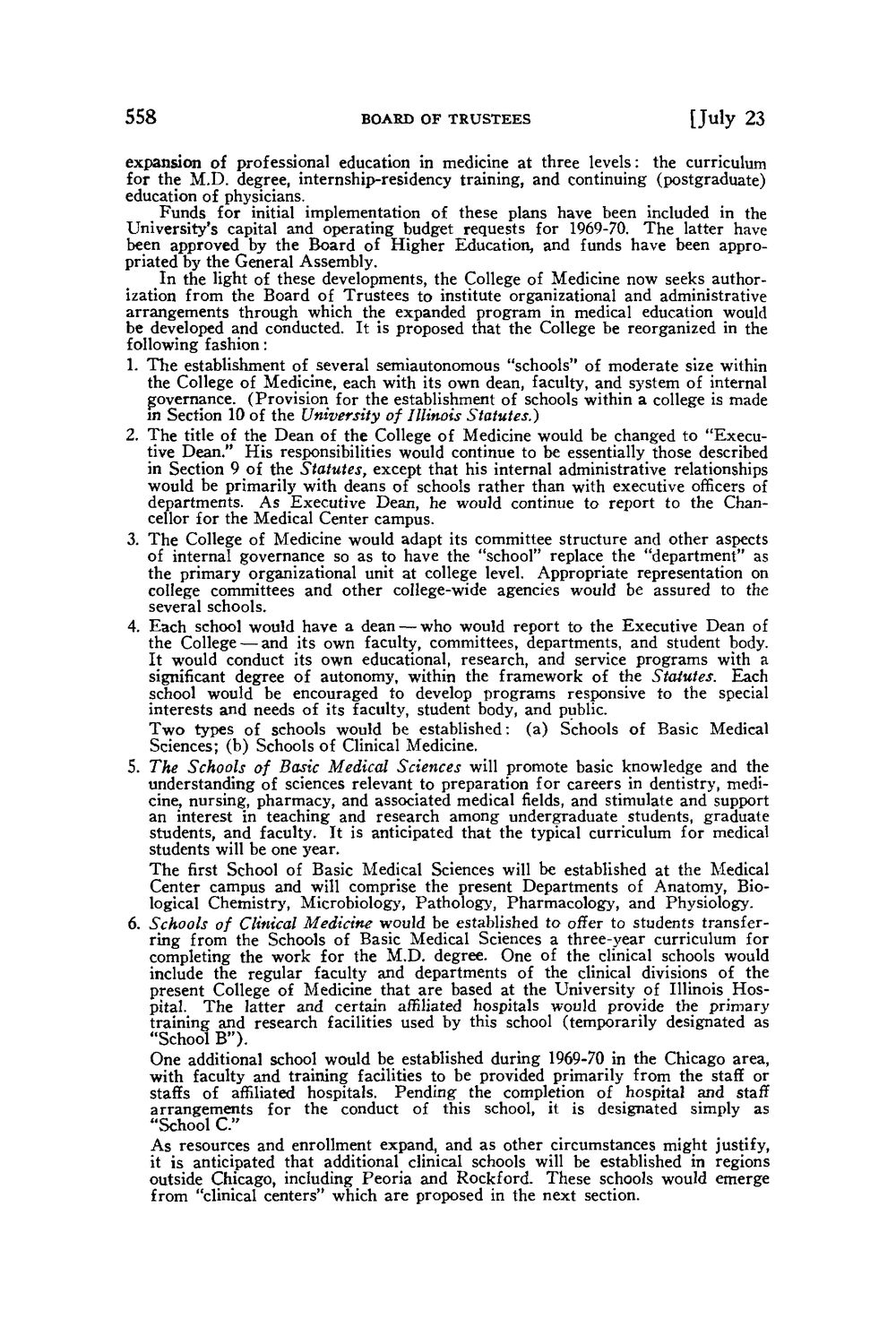| |
| |
Caption: Board of Trustees Minutes - 1970
This is a reduced-resolution page image for fast online browsing.

EXTRACTED TEXT FROM PAGE:
558 BOARD OF TRUSTEES [July 23 expansion of professional education in medicine at three levels: the curriculum for the M.D. degree, internship-residency training, and continuing (postgraduate) education of physicians. Funds for initial implementation of these plans have been included in the University's capital and operating budget requests for 1969-70. The latter have been approved by the Board of Higher Education, and funds have been appropriated by the General Assembly. In the light of these developments, the College of Medicine now seeks authorization from the Board of Trustees to institute organizational and administrative arrangements through which the expanded program in medical education would be developed and conducted. It is proposed that the College be reorganized in the following fashion: 1. T h e establishment of several semiautonomous "schools" of moderate size within the College of Medicine, each with its own dean, faculty, and system of internal governance. (Provision for the establishment of schools within a college is made in Section 10 of the University of Illinois Statutes.) 2. The title of the Dean of the College of Medicine would be changed to "Executive Dean." His responsibilities would continue to be essentially those described in Section 9 of the Statutes, except that his internal administrative relationships would be primarily with deans of schools rather than with executive officers of departments. As Executive Dean, he would continue to report to the Chancellor for the Medical Center campus. 3. The College of Medicine would adapt its committee structure and other aspects of internal governance so as to have the "school" replace the "department" as the primary organizational unit at college level. Appropriate representation on college committees and other college-wide agencies would be assured to the several schools. 4. Each school would have a dean — who would report to the Executive Dean of the College — and its own faculty, committees, departments, and student body. It would conduct its own educational, research, and service programs with a significant degree of autonomy, within the framework of the Statutes. Each school would be encouraged to develop programs responsive to the special interests and needs of its faculty, student body, and public. T w o types of schools would be established: (a) Schools of Basic Medical Sciences; (b) Schools of Clinical Medicine. 5. The Schools of Basic Medical Sciences will promote basic knowledge and the understanding of sciences relevant to preparation for careers in dentistry, medicine, nursing, pharmacy, and associated medical fields, and stimulate and support an interest in teaching and research among undergraduate students, graduate students, and faculty. It is anticipated that the typical curriculum for medical students will be one year. The first School of Basic Medical Sciences will be established at the Medical Center campus and will comprise the present Departments of Anatomy, Biological Chemistry, Microbiology, Pathology, Pharmacology, and Physiology. 6. Schools of Clinical Medicine would be established to offer to students transferring from the Schools of Basic Medical Sciences a three-year curriculum for completing the work for the M.D. degree. One of the clinical schools would include the regular faculty and departments of the clinical divisions of the present College of Medicine that are based at the University of Illinois Hospital. The latter and certain affiliated hospitals would provide the primary training and research facilities used by this school (temporarily designated as "School B"). One additional school would be established during 1969-70 in the Chicago area, with faculty and training facilities to be provided primarily from the staff or staffs of affiliated hospitals. Pending the completion of hospital and staff arrangements for the conduct of this school, it is designated simply as "School C." As resources and enrollment expand, and as other circumstances might justify, it is anticipated that additional clinical schools will be established in regions outside Chicago, including Peoria and Rockford. These schools would emerge from "clinical centers" which are proposed in the next section.
| |